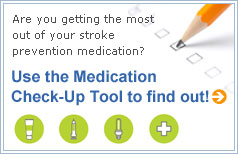
Talking to your doctor
Working with your doctor is an important part of managing your risk of stroke. Be prepared and learn how to talk to your doctor.
Stroke and Atrial Fibrillation: Are You at Risk?
If there was a health condition that tripled or even quintupled your risk of a stroke, wouldn't you want to know about it? That medical condition is atrial fibrillation (AFib), and you could be at risk.
AFib is the most common type of irregular heartbeat, and it affects approximately 200,000 Canadians. Some people with AFib don't experience any symptoms, so they may not even know they have it!
AFib is one of the major causes of stroke. It causes up to 15% of all strokes and one-fourth of strokes in people over 40. With AFib, the upper chambers of the heart quiver or contract in a disorganized way. This causes blood to pool in the heart, where it can form blood clots. These blood clots can then travel through the bloodstream into the brain, where they can cut off blood flow, causing a stroke.
But the news isn't all bad. People with AFib can dramatically reduce their risk of stroke by following their doctor's treatment plan to manage their AFib and help reduce their risk of having a stroke due to a blood clot.
There are many different treatment options for AFib, and you and your doctor will work together to find a plan that's right for you. AFib may be managed with medications or special procedures to deliver controlled electrical pulses to help control the heartbeat. Healthy lifestyle changes can also help you live well with AFib. Your doctor may also recommend a medication to reduce your risk of a stroke caused by a blood clot.
Unfortunately, many people aren't taking steps to reduce their risk of a stroke because they don't know they have AFib. Could you be one of them? Here's how to tell if you might have AFib. Although some people with AFib do not experience any symptoms, other people with AFib may have symptoms* including:
- palpitations (an irregular or rapid heartbeat)
- chest pain, discomfort, or tightness
- dizziness, light-headedness, or fainting
- fatigue and weakness
- shortness of breath or becoming easily tired after exercise
- sweating
*This list includes common AFib symptoms but is not a complete list of all possible symptoms. Some people may have additional AFib symptoms not listed above.
If you experience any of these symptoms, talk to your doctor about whether you may have AFib and, if so, how you can reduce your risk of a stroke.
Did you find what you were looking for on our website? Please let us know.






